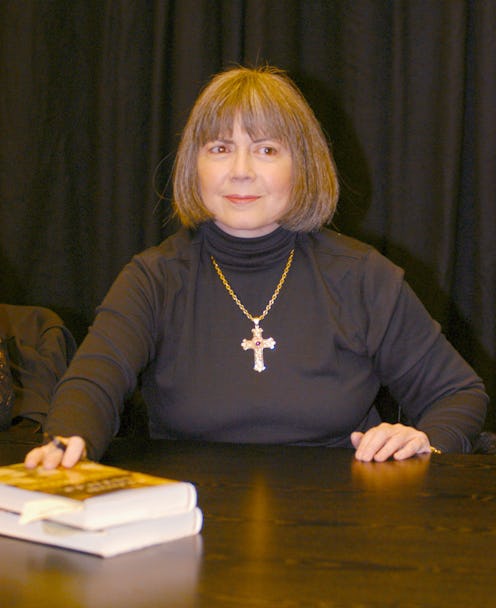One author has had it with cultural criticism. After a rash of one-star reviews hit Kate Breslin's For Such a Time on Amazon and Goodreads, novelist Anne Rice called political correctness "censorship." Taking "internet [sic] lynch mobs" to task, Rice displayed an unexpected hypocrisy and lack of respect for cultural criticism.
For Such a Time is Kate Breslin's controversial romance novel, detailing a relationship between an SS-Kommandant and a "Jewess" — no, really, Breslin uses that word — at Theresienstadt, a Nazi concentration camp in what was at the time Czechoslovakia. It's a retelling of the story of Esther, which generally involves a young Hebrew woman who must masquerade as a gentile to avoid execution, but must ultimately reveal her faith and heritage to stop her royal husband from massacring her people. In Breslin's version, Hadassah, thanks to her blue eyes and blonde hair, is able to pass for German, and secures a job working for the Kommandant, with whom she falls in love. However, instead of putting her life on the line by revealing her Jewish heritage to her lover, Breslin's Hadassah converts to Christianity, and that's what saves her. Full stop.
Criticism of For Such a Time as anti-semitic and dangerous, then, is not uncalled for, especially considering the fact that the book has been nominated for awards in the romance genre. Even if Breslin's intent isn't malicious, her novel remains wholly disrespectful of Jewish history, experience, and faith. Audiences outraged at this ignorance have spoken out on one of the most accessible platforms — Internet reviews — to criticize For Such a Time and its author.
Rice's issue with these reviewers seems to hinge on the fact that many of them haven't read the book. But the vampire novelist herself admits she hasn't read it, either. That's just the tip of the hypocrisy iceberg here, however. Rice has a penchant for calling her detractors names like "stupid," "arrogant," and "slander[ous]," but even that is all small potatoes. The real horror dates back to 2013, when Rice sicced an Internet lynch mob on a blogger who didn't like her book. After posting a link to Facebook of a negative review from a blogger who, at the time, had around 100 followers, Rice thanked her devotees for generating so much traffic via their harassing comments: "I hope Miss Articulate is pleased with the numbers who have discovered her blog."
Anne Rice's Interview with the Vampire was among the first vampire novels I ever read, and I hold her in fairly high regard as a writer. But enjoying and respecting something does not mean raising it above criticism: people, institutions, and art included. And criticism, no matter how harsh, is not censorship, and it certainly isn't a horrific physical attack, like the "lynch mob" Rice describes so frequently.
Ultimately, the issue here is all about power dynamics. There is the problematic power dynamic in Breslin's novel, where the marginalized woman falls in love with a man of utmost privilege, who has every available power to annihilate her, should he so desire. There are the masses rising up and speaking out against an offensive novel released by a prominent Christian publisher. And then there's the power dynamic of Rice — a beloved author — and her legion of fans, whom she knows she can turn however she sees fit. Unfortunately, Rice is on the wrong side of this issue.
